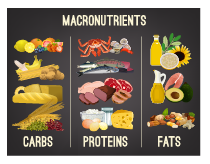
Macronutrients are compounds found in food that are used by the body to make energy. The three macronutrients are carbohydrates (4 kcal/gram), protein (4 kcal/gram), and fats (9 kcal/gram).
When it comes to weight loss, overall calorie consumption is more important than dietary macronutrient composition. In general, a person must consume a 500 kcal/day deficit for one week in order to lose one pound. A 1000 kcal/day deficit for one week will lead to a two pound weight loss, and so on.
When it comes to strength training, dietary macronutrient composition is important. During exercise, the body first utilizes carbohydrates for energy. Once carbohydrates are depleted, the body must use fats or protein for fuel. Physically fit people do not have a lot of fat stores, so their bodies must use protein. Protein is a major component of muscle, and protein metabolism is undesirable since it can lead to muscle breakdown. Enlarging muscles also need protein and amino acids to grow or hypertrophy. Proteins are made up of amino acids that are classified as essential (cannot be manufactured in the body and are obtained from food) and nonessential (manufactured by the body). In order to prevent muscle breakdown and promote muscle growth after tissues have been damaged, people who strength train should increase the amount of protein in their diet. A general rule for protein consumption is as follows:
Normal activity:0.8 g/kg body weight/day
Regular endurance exercise:1.2 – 1.4 g/kg body weight/day
Strength training:1.4 – 1.8 g/kg body weight/day
Despite popular notion, carbohydrates are not your enemy. Carbohydrates are the main source of energy for all body functions and muscular exertion, especially with high-intensity exercise. Excess carbohydrates are stored as glycogen in the liver and muscles. Glycogen muscle stores are easily converted to carbohydrates to provide energy during tough workouts. Maintaining good carbohydrate intake will improve performance and reduce the risk of exercise-induced muscle breakdown. It’s recommended that moderately active people consume 45 – 65% of their total calories from carbohydrates. As you can see, carbohydrates should make up the highest percentage of calories that you eat.
At 9 kcal/gram, fats are the most calorie dense macronutrient, which means high-fat foods have a lot of calories. Everyone should consume some amount of healthy fats, but people who are trying to lose weight may want to limit their intake. The acceptable range of fat intake for most adults is 15-30% of total caloric intake, and 20-25% in athletes. There are two types of fat: Saturated fats (these are the fats to stay away from as much as possible, especially trans fat); and unsaturated fats (these are stored for energy and help aid muscle building).
Here are some general tips for macronutrients when training:
- Protein: Try to incorporate real sources of protein like lean beef, chicken, fish, dairy, and eggs. Do not rely heavily on protein powders. You should take in protein every 3-4 hours throughout the day.
- Carbohydrates: Do not cut carbs too low because they are the fuel that gives you the energy you need during a workout. Eat good carbs like whole grains, sweet potatoes, oatmeal, and brown rice.
- Fats: Consume healthy fats from sources like avocados, olive oil, dairy, meat, eggs, oils, nuts and fish.
I hope that helps clear up the abundance of nutrition information out there. If you have any questions email me at kristine@mystraightfitness.com Happy training!
